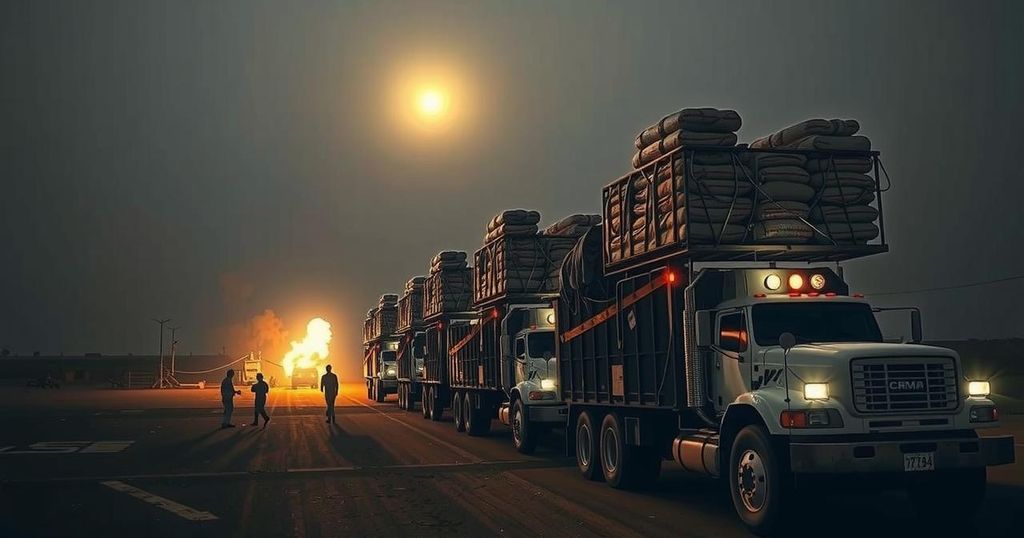Zamzam camp in Sudan has received its first aid convoy in months, providing critical assistance to 500,000 displaced individuals amid a dire famine exacerbated by civil war. The United Nations’ WFP emphasizes the need for secure passage and sustained support to reach vulnerable populations. Recent fighting and impassable roads have severely hindered food deliveries, highlighting the urgent humanitarian needs in the area.
In Sudan, the Zamzam camp, which shelters approximately 500,000 displaced individuals, has received its first aid convoy in months amid a devastating famine exacerbated by ongoing civil conflict. This humanitarian effort, led by the United Nations’ World Food Programme (WFP), followed severe delays caused by intense fighting and treacherous road conditions during the rainy season. The civil war, primarily a power conflict between the military and the paramilitary Rapid Support Forces (RSF), has resulted in the world’s most significant humanitarian crisis, displacing 10 million people and precipitating widespread hunger.
Zamzam’s population has surged since April as conflict escalated in the nearby city of el-Fasher, which remains under military control amidst the power struggle. In August, food security experts signaled the onset of famine within the camp, citing criteria including an acute lack of food, high malnutrition rates among children, and daily fatalities related to starvation. The WFP’s recent convoy is part of a broader initiative involving over 700 trucks aimed at delivering supplies to 1.5 million individuals facing dire circumstances.
Laurent Bukera, the WFP’s regional director for Eastern Africa, emphasized, “These trucks carry more than just food; they carry a lifeline for people caught in the crossfire of conflict and hunger. We need guaranteed safe passage for our trucks and sustained international support to reach every family at risk.” Notably, the arrival of this aid marks a critical step, following accusations against both warring parties for obstructing and looting aid resources, claims they deny. Key logistical routes for aid delivery, particularly from Chad, have experienced fluctuation in accessibility due to military control and government opposition, yet recent agreements have temporarily restored access.
The current situation in Sudan reflects a severe humanitarian crisis stemming from an ongoing civil war, which has lasted over 18 months. The fighting, primarily between the Sudanese army and the RSF, has exacerbated conditions of extreme hunger and displacement, with millions of people affected. The Zamzam camp, situated in a conflict-ridden area, has been particularly hard-hit, qualifying for famine due to the severe lack of food and rampant malnutrition among children. Understanding the complexity of the conflict is vital to grasp the urgency and significance of international aid efforts, which have faced numerous obstacles, including violent confrontations and access restrictions. The intervention by the WFP and other organizations serves as a crucial lifeline for the affected populations, highlighting the interplay between humanitarian needs and security concerns in the region.
The delivery of the aid convoy to Zamzam camp signifies a critical intervention in response to a worsening humanitarian crisis in Sudan caused by prolonged conflict. With the camp witnessing an influx of displaced individuals and declared famine conditions, the role of the WFP and other humanitarian organizations is vital in mitigating the disastrous effects of the civil war. Continued international support and guaranteed access for relief efforts remain imperative to addressing the immediate needs of those suffering from hunger and displacement amidst ongoing violence.
Original Source: www.bbc.com






